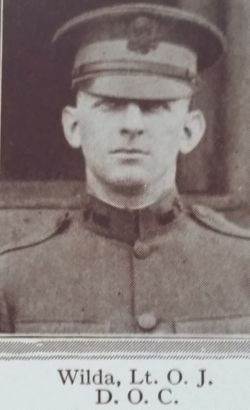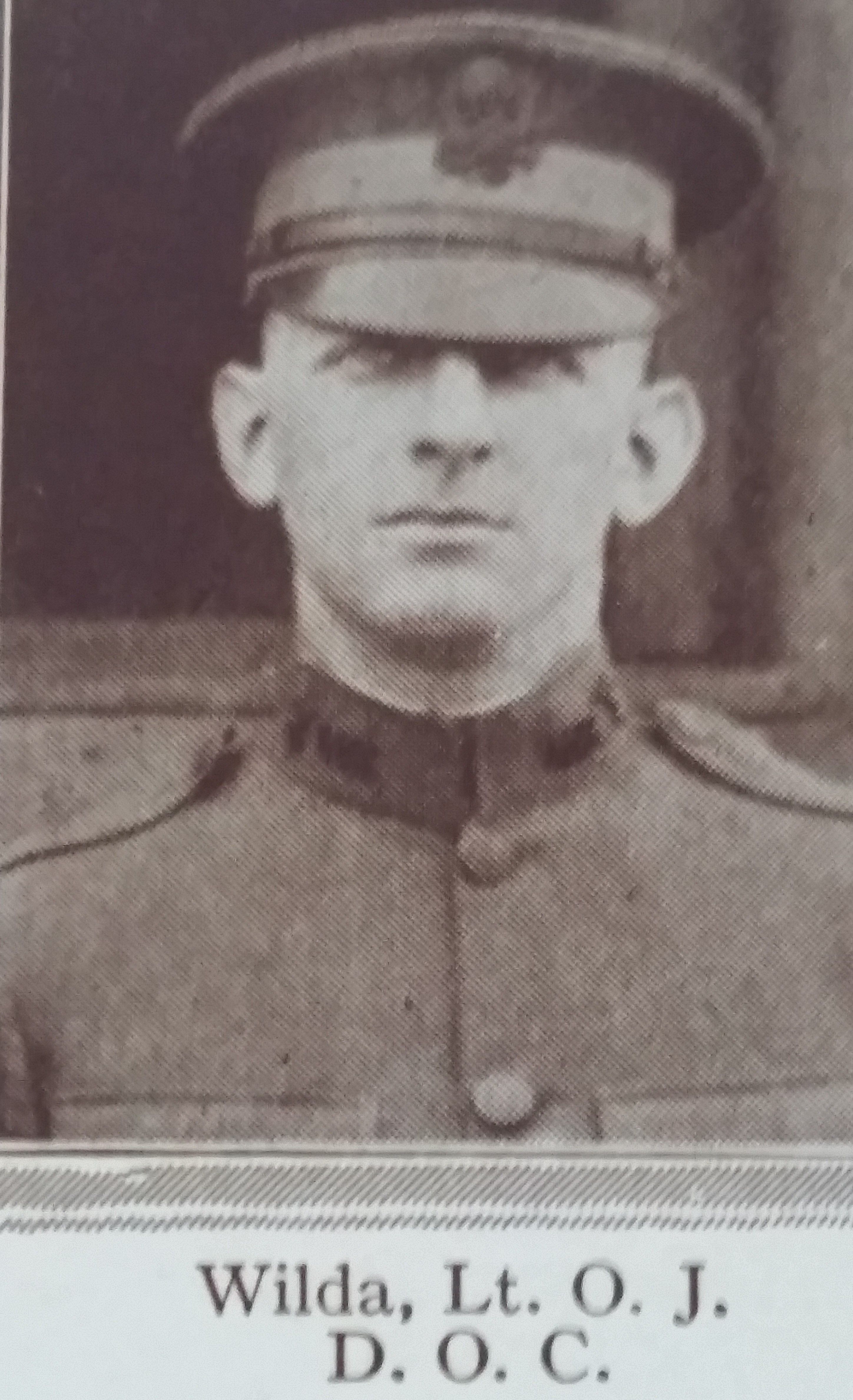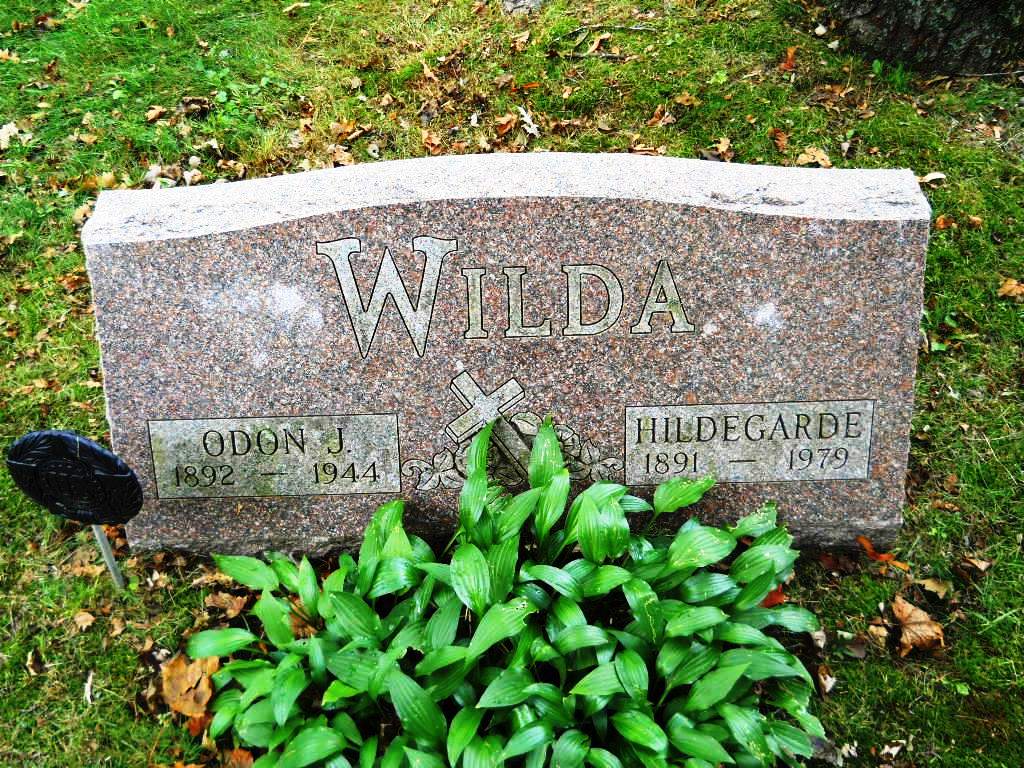ODON J. WILDA
Dr. Wilda Dies Suddenly of A Heart Attack
Dr. Odon J. Wilda, 53 (photo), of 836 North Sixth street, well known
Manitowoc dentis and a major in World War I, died suddenly of a heart
attack ???Saturday evening while (too light to read) at the rear of
the ???.
Dr. Wilda had (paragraph too light)
Funeral Wednesday
(too light to read)
Wife Survives
(too light) city. She survives with a daughter (private), a son
(private), three sisters, Mrs. Oscar Belinske, Mrs. Gertrude
Schliesleder and Miss Mayme Wilda, all of this city.
The body may be viewed at the funeral home after seven o'clock this
evening. The rosary will be recited Tuesday evening at 7:30 at the
funeral home.
Manitowoc Herald Times, Monday, June 26, 1944 p.2
********
Funeral services for Dr. Odon J. Wilda were held this morning from the
Wattawa, Urbanek and Schlei funeral home at 8:30 and at 9:00 o'clock
from the Sacred Heart Catholic church, the Rev. L.M. Schorn officiating.
Burial was in Evergreen cemetery with military rites performed by the
Drews-Bleser post of the American Legion.
Members of the Manitowoc Dental Association served as honorary pall-
bearers. (omitted for privacy).
Manitowoc Herald Times Wednesday, June 28, 1944 p.2
********
[Odon Justin Wilda/d. 06-24-1944/age 52 yrs./cause: coronary
occlusion/bur. on Mrs. Hilda L. Wilda lot]
********
CAPT. ODIN(sic) WILDA TELLS OF THRILLS ON BATTLE LINE
Manitowoc Man in Service Since August 10th Experienced Much Excitement
in Big Drives of War
A tale thrilling in the excitement of adventures through which he
has passed is told in letters recently received from Capt. Odin Wilda
of this city, who is serving with the U.S. dental corps overseas. Capt.
Wilda has been attached to troops in action on the battlefronts since
Aug. 10 and previous to the signing of the armistice experienced many
thrills of the war zone. Sailing from New York on June 28, via Halifax,
where he witnessed the destruction caused by the explosion of an oil
steamer there a short time previously, he sailed from Halifax on July 4
with an escort of seventeen boats, the largest troop convoy up to that
time. The trip took the transport around the north pole and Capt. Wilda
says that it was “sure some cold.” On July 15 off the Irish coast, Capt.
Wilda’s transport ran into a nest of German submarines and two of the
number were “officially” put out of commission. The boat landed at
Liverpool the evening of July 16 and at 12 o’clock Capt. Wilda entrained
for South Hampton, where he remained but one day and then sailed on a
cattle boat to France landing at Havre. Remaining at Havre for a week the
contingent was loaded into box cars and sent to Ource where it remained a
few days and then was sent to Minot to join the 350th regiment. On Aug. 10,
Capt. Wilda left Minot and entrained for the St. Mihiel sector, reaching
Fong from which place the command marched to Frenchville and later to the
trenches where the command took part in the memorable drive in which the
American forces obliterated the St. Mihiel salient. Capt. Wilda says he
missed the first part of the show as on Aug. 29 he was detailed to Tangres
where he remained until Sept. 16 and returned to his regiment on the 19th
on which day he experienced his first baptism of shell fire while en route
to the front lines, the Germans shelling the road all along the way. “I
didn’t know what fear was at this time but now I have a wholesome respect
for those big shells,” said Capt. Wilda. “The morning of Sept. 21 we put
over a big raid and incidently chased Fritz back midst plenty of excitement.
Capt. Wilda tells of the regiment being moved to Monta-ta-Coucon, which
place was used by the crown prince as headquarters in his drive on Verdun
and it was here that Capt. Wilda was lost for a time and in some manner
became separated from his command for a night. On Sept. 26 following the
drive in that sector by the Americans, Capt. Wilda’s command moved to the
newly taken ground which became a pretty warm spot as result of the attacks
of the Boche which he says tore up the buildings which the American artillery
had left standing. “We found a cellar back of a church which we used as our
aid station. Each minute of the day Fritz took a brick out of the church until
it was leveled and we were in line of his fire. We had good protection but in
spite of all the German crushed the roof, knocking out one wall and let the
ceiling of our place of business fall twice.” Says Capt. Wilda. On Oct. 3
Capt. Wilda says his command “went over the top” the battalion leading all
through the light. The aid station was stationed right back of the line where
the troops were lighting just outside the town of Andevane. Things got pretty
hot and each and every advance seemed to be made in a warmer atmosphere,
according to the captain who wound up at Villers, where everything was quiet
for a time. One of the interesting incidents told in Capt. Wilda’s letter
relates how a German plane swooping over the field in which his command was
operating, scattered the soldiers in all directions, each one seeking safety
on his own hook. Capt. Wilda and companions, who were with him, covered
considerable territory that night, reaching the American lines toward morning
to learn that they had been traversing territory bordering the German lines.
Recounting his experience at Launeville where his command arrived on the
afternoon of Oct. 6, Capt. Wilda says that of all his experiences, this will
be the best remembered. The course taken by the troops was over a road which
for a half mile was directly under the German eye and when the Americans
attempted to cross, the enemy opened fire, “On this road while moving down
the hill they had us running circles and one of the funniest incidents was
when two of us tried to hide behind a sapling three inches thick. A shell
which exploded covered us with mud but we covered the distance over the road
in time that I bet was not far short of ten flat,” says Capt. Wilda’s letter.
Capt. Wilda was at Stanay where the Americans had driven the Germans to cover
on the morning that the news of the signing of the armistice was received. He
says that following a terrible battle, the night previous, the American forces
had started an attack early on the morning of Nov. 11 when the news came to
cease firing. The Yanks were inclined to question the order and were taking
no chances keeping an eye on the enemy continually but were finally convinced
that the news was official and then began to cheer and in one large chorus
sang “Over There.” Speaking of the armistice and the closing of the war, Capt.
Wilda said “you may rest assured that all were happy but their sentiment was
that of all the boys on the line: ‘the armistice saved Germany, saved many
lives and much work, but it robbed us of a chance to invade the enemy country
and break up its peaceful homes as he had so ruthlessly broken up the homes
of the French peasants; it robbed us of a chance to bring destruction to his
militarism, of our chance to lay waste his land, driving his people into the
open world as he had done by his terrorism. Glad it’s over? Yes, for the sake
of humanity. As it is Germany knows only the cost in lives and not the privations
of war such as the French have been forced to endure.” Capt. Wilda’s letter is
lengthy and a most interesting one.
Manitowoc Herald News, Thursday, March 06, 1919 Page 4
ODON J. WILDA
Dr. Wilda Dies Suddenly of A Heart Attack
Dr. Odon J. Wilda, 53 (photo), of 836 North Sixth street, well known
Manitowoc dentis and a major in World War I, died suddenly of a heart
attack ???Saturday evening while (too light to read) at the rear of
the ???.
Dr. Wilda had (paragraph too light)
Funeral Wednesday
(too light to read)
Wife Survives
(too light) city. She survives with a daughter (private), a son
(private), three sisters, Mrs. Oscar Belinske, Mrs. Gertrude
Schliesleder and Miss Mayme Wilda, all of this city.
The body may be viewed at the funeral home after seven o'clock this
evening. The rosary will be recited Tuesday evening at 7:30 at the
funeral home.
Manitowoc Herald Times, Monday, June 26, 1944 p.2
********
Funeral services for Dr. Odon J. Wilda were held this morning from the
Wattawa, Urbanek and Schlei funeral home at 8:30 and at 9:00 o'clock
from the Sacred Heart Catholic church, the Rev. L.M. Schorn officiating.
Burial was in Evergreen cemetery with military rites performed by the
Drews-Bleser post of the American Legion.
Members of the Manitowoc Dental Association served as honorary pall-
bearers. (omitted for privacy).
Manitowoc Herald Times Wednesday, June 28, 1944 p.2
********
[Odon Justin Wilda/d. 06-24-1944/age 52 yrs./cause: coronary
occlusion/bur. on Mrs. Hilda L. Wilda lot]
********
CAPT. ODIN(sic) WILDA TELLS OF THRILLS ON BATTLE LINE
Manitowoc Man in Service Since August 10th Experienced Much Excitement
in Big Drives of War
A tale thrilling in the excitement of adventures through which he
has passed is told in letters recently received from Capt. Odin Wilda
of this city, who is serving with the U.S. dental corps overseas. Capt.
Wilda has been attached to troops in action on the battlefronts since
Aug. 10 and previous to the signing of the armistice experienced many
thrills of the war zone. Sailing from New York on June 28, via Halifax,
where he witnessed the destruction caused by the explosion of an oil
steamer there a short time previously, he sailed from Halifax on July 4
with an escort of seventeen boats, the largest troop convoy up to that
time. The trip took the transport around the north pole and Capt. Wilda
says that it was “sure some cold.” On July 15 off the Irish coast, Capt.
Wilda’s transport ran into a nest of German submarines and two of the
number were “officially” put out of commission. The boat landed at
Liverpool the evening of July 16 and at 12 o’clock Capt. Wilda entrained
for South Hampton, where he remained but one day and then sailed on a
cattle boat to France landing at Havre. Remaining at Havre for a week the
contingent was loaded into box cars and sent to Ource where it remained a
few days and then was sent to Minot to join the 350th regiment. On Aug. 10,
Capt. Wilda left Minot and entrained for the St. Mihiel sector, reaching
Fong from which place the command marched to Frenchville and later to the
trenches where the command took part in the memorable drive in which the
American forces obliterated the St. Mihiel salient. Capt. Wilda says he
missed the first part of the show as on Aug. 29 he was detailed to Tangres
where he remained until Sept. 16 and returned to his regiment on the 19th
on which day he experienced his first baptism of shell fire while en route
to the front lines, the Germans shelling the road all along the way. “I
didn’t know what fear was at this time but now I have a wholesome respect
for those big shells,” said Capt. Wilda. “The morning of Sept. 21 we put
over a big raid and incidently chased Fritz back midst plenty of excitement.
Capt. Wilda tells of the regiment being moved to Monta-ta-Coucon, which
place was used by the crown prince as headquarters in his drive on Verdun
and it was here that Capt. Wilda was lost for a time and in some manner
became separated from his command for a night. On Sept. 26 following the
drive in that sector by the Americans, Capt. Wilda’s command moved to the
newly taken ground which became a pretty warm spot as result of the attacks
of the Boche which he says tore up the buildings which the American artillery
had left standing. “We found a cellar back of a church which we used as our
aid station. Each minute of the day Fritz took a brick out of the church until
it was leveled and we were in line of his fire. We had good protection but in
spite of all the German crushed the roof, knocking out one wall and let the
ceiling of our place of business fall twice.” Says Capt. Wilda. On Oct. 3
Capt. Wilda says his command “went over the top” the battalion leading all
through the light. The aid station was stationed right back of the line where
the troops were lighting just outside the town of Andevane. Things got pretty
hot and each and every advance seemed to be made in a warmer atmosphere,
according to the captain who wound up at Villers, where everything was quiet
for a time. One of the interesting incidents told in Capt. Wilda’s letter
relates how a German plane swooping over the field in which his command was
operating, scattered the soldiers in all directions, each one seeking safety
on his own hook. Capt. Wilda and companions, who were with him, covered
considerable territory that night, reaching the American lines toward morning
to learn that they had been traversing territory bordering the German lines.
Recounting his experience at Launeville where his command arrived on the
afternoon of Oct. 6, Capt. Wilda says that of all his experiences, this will
be the best remembered. The course taken by the troops was over a road which
for a half mile was directly under the German eye and when the Americans
attempted to cross, the enemy opened fire, “On this road while moving down
the hill they had us running circles and one of the funniest incidents was
when two of us tried to hide behind a sapling three inches thick. A shell
which exploded covered us with mud but we covered the distance over the road
in time that I bet was not far short of ten flat,” says Capt. Wilda’s letter.
Capt. Wilda was at Stanay where the Americans had driven the Germans to cover
on the morning that the news of the signing of the armistice was received. He
says that following a terrible battle, the night previous, the American forces
had started an attack early on the morning of Nov. 11 when the news came to
cease firing. The Yanks were inclined to question the order and were taking
no chances keeping an eye on the enemy continually but were finally convinced
that the news was official and then began to cheer and in one large chorus
sang “Over There.” Speaking of the armistice and the closing of the war, Capt.
Wilda said “you may rest assured that all were happy but their sentiment was
that of all the boys on the line: ‘the armistice saved Germany, saved many
lives and much work, but it robbed us of a chance to invade the enemy country
and break up its peaceful homes as he had so ruthlessly broken up the homes
of the French peasants; it robbed us of a chance to bring destruction to his
militarism, of our chance to lay waste his land, driving his people into the
open world as he had done by his terrorism. Glad it’s over? Yes, for the sake
of humanity. As it is Germany knows only the cost in lives and not the privations
of war such as the French have been forced to endure.” Capt. Wilda’s letter is
lengthy and a most interesting one.
Manitowoc Herald News, Thursday, March 06, 1919 Page 4
Family Members
Sponsored by Ancestry
Advertisement
Records on Ancestry
Advertisement


















